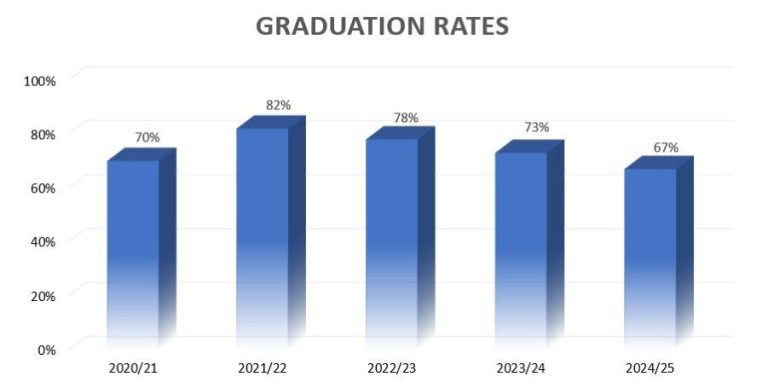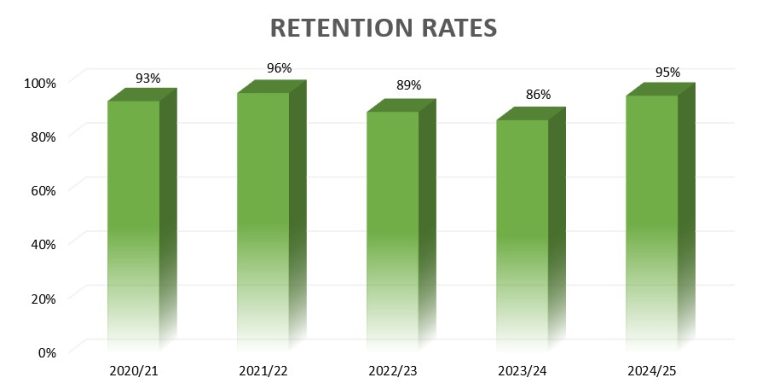Home > Student Life > Student Achievement
HOURS
8:00 am – 12:00 pm EST
1:00 pm – 5:00 pm EST
PHONE
585-582-8210
EMAIL
ashleyallen@elim.edu
FAX
585-582-8130
The Student Right to Know Act, passed by Congress in 1990, requires institutions eligible for Title IV funding, under the Higher Education Act of 1965, to calculate completion or graduation rates of certificate- or degree-seeking, full-time students entering that institution, and to disclose these rates to current and prospective students.
Please see links below for this and other helpful information.

* The completion and graduation rates for certificates, associate degrees, and bachelor’s degrees are measured at 150% of the expected time for completion (associate degree rate is 3 years from first enrollment and bachelor’s degree rate is 6 years from first enrollment).

13
Average Students Per Classroom
12:1
Student : Teacher Ratio
TITLE IX COORDINATOR Ashley Allen
PHONE 585-582-8210
EMAIL ashleyallen@elim.edu
Violations of the Code of Conduct result in disciplinary action or possible suspension. A student may be suspended from EBC after the following procedural steps took place:
Please note: A violation of the college’s Statement of Faith may result in an immediate suspension without prior written warning or Administration Hearing.
When possible, disagreements between a student and a faculty member should be resolved informally;
when necessary (for example, when involving issues of academic integrity), a faculty member shall
follow the relevant policies and procedures to resolve the issue. If a review by all relevant parties and
committees has not resulted in an acceptable resolution, a student may file a formal Academic
Grievance.
Academic grievances may originate with such student complaints as perceived violation,
misinterpretation, or inequitable application of course or program requirements, unfair or inequitable
treatment by a faculty member, unjustified accusations concerning academic integrity, unfair or
inequitable application of, grading policies, and the like. Elim Bible Institute and College abides by a
six-month statute of limitations for filing an academic grievance, which must be resolved within a
reasonable period of time.
A complaint may be initiated by a student when he/she believes they have been treated unjustly. EBC provides a way for students to address personal grievances and file any complaints, whether the grievance is against EBC or its staff and faculty or another student or tenant. Anonymous complaints or feedback for EBC, faculty, or staff may also be submitted to the “Suggestion Box” located in the College Hall Student Lounge.
If the student feels that he/she has been treated unfairly in the process outlined above or that the issue has not been resolved in a satisfactory manner:
Any student may report the incident to:
Distance Education students from out-of-state locations may report the incident to:
The Transnational Association of Christian Colleges and Schools (TRACS) values the role of information provided by students, employees, and others in performing its role of monitoring institutional compliance with TRACS Accreditation Standards. TRACS is also interested in assuring that member institutions maintain appropriate complaint / grievance and due process procedures, provide procedural fairness, and consistently apply their policies and procedures.
The TRACS procedures for the review of complaints involving member institutions are designed to enable TRACS to address possible violations of the TRACS Accreditation Standards and the proper and uniform application by institutions of their own policies and procedures, as they relate to the TRACS Accreditation Standards.
For all types of complaints concerning colleges and universities in New York State, the first course of action must be to try to resolve the complaint directly with the administration of the college or university involved. The Office of College and University Evaluation will not review a complaint until all grievance procedures at the institution have been followed and all avenues of appeal exhausted and documentation provided that such procedures have been exhausted. Please note: Every New York State college and the university is required to establish, publish, and enforce explicit policies related to redress of grievances.
A student has the right to lodge a complaint or grievance. The institution should ensure that all concerns and complaints of students are addressed fairly and are resolved promptly. Student complaints relating to consumer protection laws offered under the terms and conditions of the State Authorization Reciprocity Agreement (SARA), must first be filed with the institution to seek resolution. Please refer to the Student Complaint Process Policy.
SARA consumer protection provisions require the institution’s home state (New York), through its SARA State Portal Entity, to investigate and resolve allegations of dishonest or fraudulent activity by the state’s SARA-participating institutions, including the provision of false or misleading information.
Complaints related to SARA can be submitted to the New York State Portal Entity. As indicated on the NC-SARA website, the following applies:
Title IX of the Education Amendments of 1972 (20 U.S.C. § 1681) is an all-encompassing federal law that prohibits discrimination based on the gender of students and employees of educational institutions which receive federal financial assistance. When the form has been completed and signed by you, and then signed by the Title IX Coordinator or a Deputy, your complaint has been properly received and noted by the college. We will provide you with a copy of this form as well as complete information about the Title IX complaint process.
7245 College St., Lima, NY 14485 © 2024 Elim Bible Institute and College. All rights reserved.
7245 College Street
Lima, NY 14485
585 582 1230